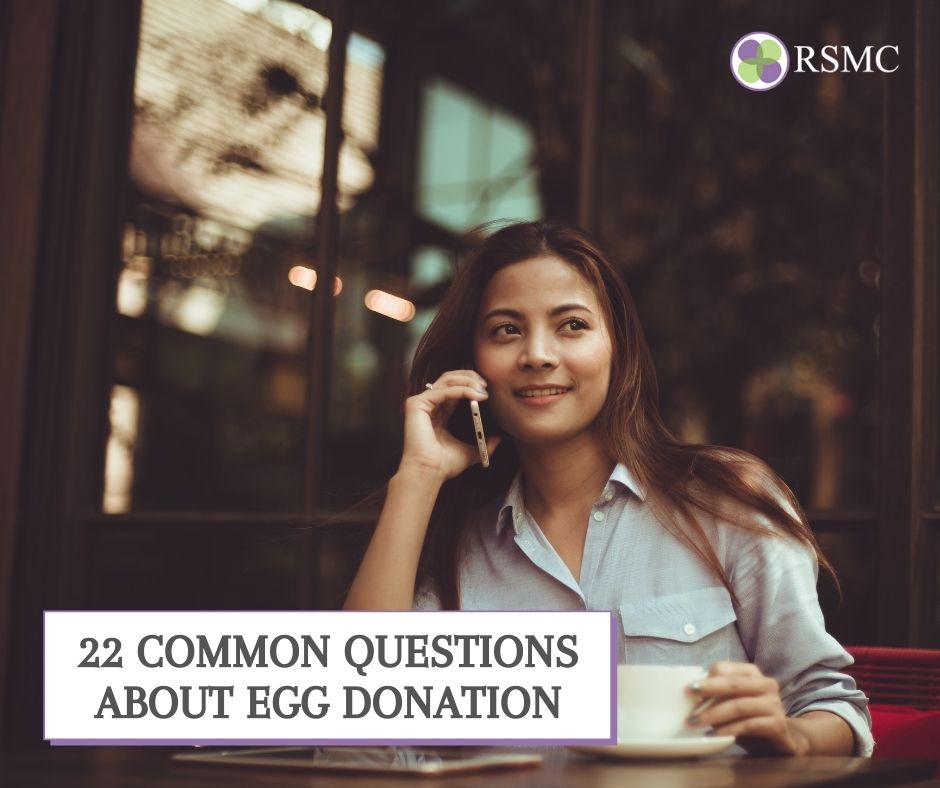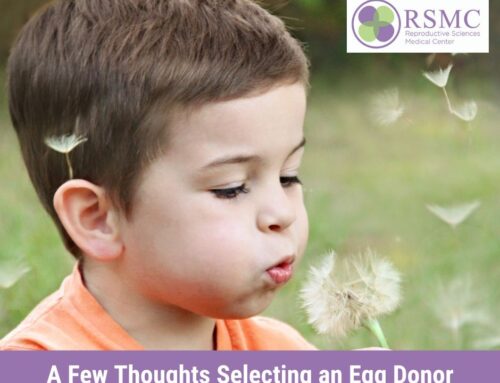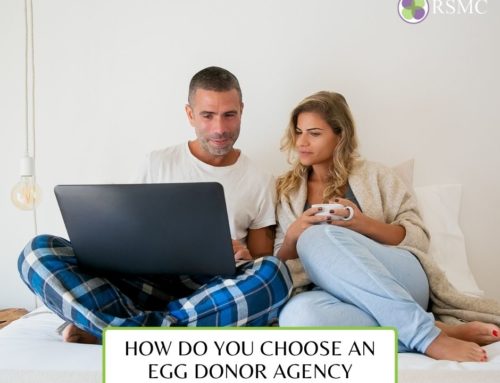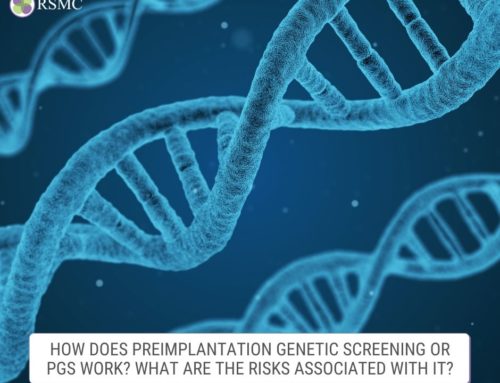The number of egg donors has been increasing in recent years, raising the hope of couples who cannot conceive by themselves. While there is uncertainty surrounding the egg donation process & the qualifications to become an Egg Donor, this article should help clarify the process.
According to the statistics published in the Journal of American Medical Association, the number of women becoming Egg Donors rose by more than 70 percent during the first ten years of the 21st century.
The Food and Drug Administration (FDA) has strict regulations and guidelines regarding all forms of donations, including egg donations. Fertility centers, including ours in San Diego, must follow these guidelines. Thus, women trying to become Egg Donors need to undergo rigorous testing and physical, mental, and DNA screening.
RSMC fertility clinic (San Diego, California) outlines specific points in the egg donation process and Egg Donor qualifications below. While some of these criteria might limit your chance of becoming an egg donor, you can still make a difference through our referral program!
1. What is egg donation?
Egg donation is a form of Assisted Reproductive Technology (ART). A fertile woman undergoes a medical procedure and donates eggs to another woman to help her conceive. Typically a doctor removes the egg to fertilize outside of the donor’s and carrier’s bodies. Following successful fertilization, the physician then transfers the resulting embryo into the gestational carrier’s uterus.
2. Why is egg donation significant?
Egg donors occupy a critical space in the world of assisted fertility. For women who cannot conceive with their eggs or same-sex couples, egg donors serve as a vital link to actualizing their dream of having children.
3. Can I become a Donor if I have PCOS?
Short answer – no. Women living with polycystic ovary syndrome (PCOS) are not qualified to donate eggs. There are some exceptions, though. PCOS patients can give out their eggs to their sisters and other members of their family. Suppose the intended mother wants to share biological ties with the future babies. In that case, they often select a relative for egg donation.
PCOS often results in menstrual cycle problems. Hence, if a patient with PCOS donates eggs, thorough planning and monitoring of the donation process and status of the eggs prove essential.
Ovarian stimulation is one of the significant steps of IVF treatment. Women with PCOS are at a higher risk of developing ovarian hyperstimulation syndrome (OHSS) resulting from the stimulation. OHSS may also lead to weight gain, shortness of breath, abdominal pains, enlarged and painful ovaries, etc. Therefore, PCOS patients are not qualified to donate eggs in many cases.
4. Can I donate eggs if I have herpes?
Past treatment of an STD like herpes or the Human papillomavirus (HPV) improves the chances of one becoming an egg donor. However, you will not be allowed to begin a cycle if you are still experiencing a herpes outbreak.
If your assessment only indicates the presence of HPV or herpes antibodies, you can still donate eggs. Neither HPV nor herpes can be transmitted via egg donation. Most clinics will ensure you are not experiencing a herpes outbreak prior to initiating your donation cycle. If you experience an outbreak in the middle of a cycle, your physician may need to cancel the cycle. Other diseases such as syphilis and Hepatitis prevent egg donation because they transfer from donor to baby through the eggs.
5. Can I donate eggs if I am suffering from depression?
Women who are depressed and placed on anti-depressant medications can’t donate eggs. The FDA requires all potential Egg Donors to undergo extensive psychological screening to meet the qualifications and criteria, and depression hardly goes unnoticed. For this reason, a lot of women with depression get turned down.
Since the process of egg donation involves injections of fertility hormones, it may lead to contradictions with drugs used to combat depression. Another reason why women with depression are not usually allowed to donate eggs is that depression can be heritable.
6. Can I become an Egg Donor if I’m a smoker?
No. You cannot donate eggs if you smoke. Smoking can lead to a significant decrease in natural fertility. It can also result in other health problems. Moreover, being a smoker puts both the Donor and the baby at considerable risk.
Women smokers find it more challenging to get pregnant naturally. Their bodies produce lesser amounts of FSH compared to women who don’t smoke. Also, they usually reach menopause sooner than expected. All these facts make them ineligible for egg donation. To become an Egg Donor, you need to have stopped smoking for at least six months.
7. Can I become an Egg Donor if I am overweight?
For the best results, donors between the BMI range of 18 and 28 boost chances of success. Whether you weigh more or less than you should, you will be disqualified in most cases because weight issues cause a decrease in natural fertility. If the Donor is underweight or overweight, it could affect the number and quality of the retrieved eggs.
Overweight women have more adipose — or fat tissue — than women of healthier weight. This tissue synthesizes hormones like cytokines, which can lead to swelling and inflammation. Adipose can affect egg development and make egg retrieval more difficult.
Adipose tissue also produces hormones that can harm the secretion of progesterone and estradiol in the ovaries. As you may already know, these hormones are essential for egg development and fertility.
8. Does breastfeeding disqualify me from becoming an Egg Donor?
If you are breastfeeding, you can’t donate eggs until you finish weaning. The drugs and hormone-heavy treatment involved in egg donation for IVF are incompatible with breastfeeding. The reason is that the hormones and medications may pass onto the child through the breastmilk. So, you can make egg donations if you recently had a child who has been weaned, but not if you are still breastfeeding.
9. Can I become a Donor if I use an IUD?
Yes, of course. Using an intrauterine device (IUD) does not stop you from donating eggs. If it’s a hormonal IUD, you may need to take it out before the hormone treatment. But suppose the ovarian assessment shows that you have low numbers of eggs. In that case, you will need to wait until you’ve had two regular menstrual cycles before commencing the donation process.
Women who use a non-hormonal IUD may also need to wait for some time before donating eggs. Since this type of IUD does not release any hormones, it will not affect the FSH treatment. Additionally, non-hormonal devices can remain in position during treatment.
10. Can I be an Egg Donor if I had my tubes tied?
A tubal ligation doesn’t impact the production of eggs in the ovaries. Hence, women who have undergone the surgical procedure can still donate their eggs.
Although women usually think that a tubal ligation disqualifies them from becoming donors, egg retrieval occurs directly through the follicles. So, it does not matter whether the tubes are tied or cut since the egg doesn’t enter the body.
11. Can I be an Egg Donor if I’m on birth control?
Sure, you can. Being on birth control does not affect your chances of becoming an Egg Donor. You only need to remove the intrauterine hormonal devices — as opposed to pills or patches — before the commencement of the egg donation process. It is strongly recommended that you abstain from sexual intercourse during the egg retrieval cycle so that you do not become accidentally pregnant. There is a higher chance of pregnancy because retrieval involves stimulating multiple eggs to get ready for fertilization instead of just the one that would do so naturally.
12. Can an 18-year-old woman donate eggs?
No, she cannot. The minimum age requirement for egg donation is 19. The reason for this age limit is to ensure the numbers and quality of the retrieved eggs. At 18, a woman is too young to meet egg donation’s basic physical and psychological requirements.
Turning 18 is a huge milestone in life, so taking a year to celebrate early adulthood before taking on huge tasks like donating eggs will help prepare you for when you turn 19!
13. If I am adopted – can I still be a donor?
Yes, it is possible to be a donor even if you’re adopted. It will be super helpful if you know your biological family’s complete health history so that doctors can anticipate any health challenges that may arise in your egg donation process.
14. Does my family have to be supportive of me as an Egg Donor?
No, your family does not have to support your quest explicitly, nor do you need their approval. It is up to you to make the decision yourself, and hopefully your passion for the process will be contagious for them. A support system is vital in maintaining your well-being pre and post-donation. Your support does not have to be a family member, although it is the recommended option.
15. What tests and screenings will I need to do?
Donors will undergo several tests and screenings to determine whether they can donate and prepare them for the egg retrieval.
- Follicle Count: This is a vaginal ultrasound examination of the ovaries to measure and monitor the development of follicles (fluid-filled sacs in the ovaries where eggs mature)
- AMH: this is a biomarker for egg reserves, assessed through a blood test
- Nicotine and drug testing
- Testing for infectious and contagious diseases
- Genetic testing, family and medical history review, and a physical examination
- Background checks and psychological evaluation.
16. What are the differences between anonymous, semi-anonymous, and known donations?
Donor contracts typically have three levels of privacy or anonymity:
- Anonymous Donor Arrangement: This is when the Intended Parents and the Donor have no means of identifying each other. Anonymous Donor Arrangement prevents any contact between both parties. The clinic or agency will present an anonymized profile of the Donor that includes all of their information. The Donor is typically not told anything about the Intended Parents. This is the only type of donation RSMC does if the IP’s don’t bring or select their donor before the consultation, such as in family situations.
- Semi Anonymous Arrangement: The Donor and Intended Parents register on the Donor Sibling Registry (SDR). This platform allows for limited communication between both parties. Your identifying information will remain anonymous unless you and the Intended Parents decide to share contacts.
- Open/Known Arrangement: The Donor and intended parents share contact information and possibly meet up physically in the open variant. There is a great degree of openness in such types, but RSMC only provides this option when the Intended Parent’s come prepared with their own candidate in mind.
The type of arrangement you and the Intended Parents choose will affect not just you but everyone involved: child and parents. The potential outcomes of your choice call upon you to thoughtfully consider your decisions. Having a plan going into the arrangement will strengthen the bonds formed as well as the chances for success!
17. Is egg donation compensation taxable income?
Yes, you do have to pay taxes on your donation compensation. The United States Tax Court has ruled that sums received by a donor are taxable income. The agency or clinic you work with will issue you a 1099 if you receive any compensation.
18. Am I required to have my medical insurance?
No, you’re not. The Intended Parents will bear all of the medications and expenses incurred during the egg donation process. If complications arise during the donation process, the clinic or agency will take out an insurance policy for you.
19. Can you briefly take me through the egg retrieval process?
A typical egg retrieval process takes anywhere between 10-14 days from start to completion. After a clinic or agency has accepted you, you will begin a two-week course of self-administered hormone injections. Egg retrieval surgery itself is a quick and minimally invasive 15 to thirty-minute procedure done under twilight anesthesia. Using vaginal ultrasound imaging, a physician will guide a small needle through the vaginal walls into each ovarian follicle. Gentle suction then coaxes the fluid that contains the egg out of the follicles. Afterward, it would help if you had someone to drive you home. It is best to go home and rest to recover properly for the 24 hours following the retrieval procedure.
20. What are the side effects of the medications?
Side effects differ from person to person. In fringe cases, the stimulating medication causes bruising and irritation at the injection site, increased vaginal discharge, and maybe even mood swings. The most severe risk to egg donors is Ovarian Hyperstimulation Syndrome (OHSS), which triggers the release of multiple eggs during ovulation that might cause permanent uterine scarring. While taking stimulating medications, you might feel fullness in the lower abdomen, copious vaginal discharge, and bloating. These symptoms usually go away on their own.
21. During the egg donation process, will I need to make any lifestyle changes? What, if any, are the restrictions?
Donors should restrict physical exercise during the cycles and the proceeding two weeks. After an egg retrieval cycle, the ovaries enlarge and become painful, so you might experience pain if engaged in intensive activities. Low-intensity activities such as walking, swimming, biking, and other low-impact exercises are okay. It is also very important to abstain from sexual intercourse during the cycle, especially after egg retrieval, in case the doctors miss a mature egg that could get you pregnant with the help of sperm from sex. Should any other problems arise, always contact your coordinator or your physician who will serve as liaison in the process.
22. Is it possible that I could get pregnant during the donation process?
Yes, you can get pregnant, especially in the first seven days after your egg retrieval procedure. It might be possible that not all of the eggs available for retrieval were extracted during the process. Donors should abstain from intercourse for the entire duration of the process and seven days after. Once you start your menses following retrieval, you need to get back on a reliable birth control method before resuming intercourse. Different clinics will have their guidelines and restrictions.
Conclusion
Egg donation is an excellent way to help another person build a family. It is a way to bring endless happiness and joy to the lives of many infertile couples. It will also help you sharpen yourself in terms of physical and mental health in order to take on the task. You also want to ensure that you qualify to be an Egg Donor so that you can best help others.
If you were wondering whether you are eligible to become a Donor, please fill out an egg donor application. You will find out instantly whether you get accepted into our egg donation program. Don’t worry. The application process is not a commitment but an easy way to determine whether you can become an Egg Donor. Please visit our Become An Egg Donor page if you’d like more info about our egg donation program.























